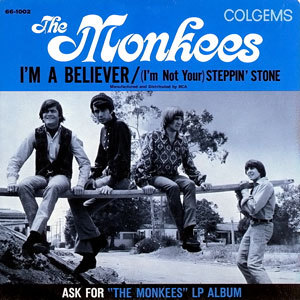Evaluating Popular Culture
 Interacting with popular culture as a Christian has been an interesting journey. In the church of my youth we couldn’t dance, drink alcohol or go to movies and a few other abominations. We looked at pop culture with suspicion. When I was in middle school a friend asked if I had heard the song “I’m a Believer” by the Monkees. I asked if that was a Christian song. That’s how far we were removed from the culture outside of our Christian circles. When I went to my first movie against my parent’s knowledge I felt so devious. My Christian beginnings demonstrated a withdrawal from popular culture. Popular culture was suspect. Movies were banned. Television was okay.
Interacting with popular culture as a Christian has been an interesting journey. In the church of my youth we couldn’t dance, drink alcohol or go to movies and a few other abominations. We looked at pop culture with suspicion. When I was in middle school a friend asked if I had heard the song “I’m a Believer” by the Monkees. I asked if that was a Christian song. That’s how far we were removed from the culture outside of our Christian circles. When I went to my first movie against my parent’s knowledge I felt so devious. My Christian beginnings demonstrated a withdrawal from popular culture. Popular culture was suspect. Movies were banned. Television was okay.  When the movie The Last Temptation of Christ came out in 1988 many Christians were enraged. At the church I served, we picked the local movie house. We were demonstrating against this exhibit the unchristian media culture. I am sure we helped more people to be interested in this rather poorly done film. Now it seems that pop culture its being consumed with less and less critical eye. We are saturated with media in music, movies and television (Justin Bieber get me off of this plane!). The impulsive consumerist mindset is not only being appreciated, it is affecting the pace, the styles and the message of the Christian church. I have realized how confused Christians can be about how to interact with popular culture. This week the readings given by Dr. Steven Garner have been instructive. Whether we attempt to withdraw, oppose or endorse popular culture we are all affected by it. We are all influenced by popular culture because we are embedded in it. Bruce Forbes declares, “Because popular culture surrounds us, it seems reasonable to assume that its messages and subtle themes influence us as well as reflect us.” It either reinforces what we believe or we tend to reject it. Kevin Vanhoozer states that popular culture is the “shared environment, practices and resources of everyday life.” Whether we are aware of it or not popular culture affects us either in dulling our spiritual lives or enlivening them. He points out that there are two general responses to it. We either respond with uncritical acceptance or have an aversion to it. Three things to consider for Christian interaction with popular culture:
When the movie The Last Temptation of Christ came out in 1988 many Christians were enraged. At the church I served, we picked the local movie house. We were demonstrating against this exhibit the unchristian media culture. I am sure we helped more people to be interested in this rather poorly done film. Now it seems that pop culture its being consumed with less and less critical eye. We are saturated with media in music, movies and television (Justin Bieber get me off of this plane!). The impulsive consumerist mindset is not only being appreciated, it is affecting the pace, the styles and the message of the Christian church. I have realized how confused Christians can be about how to interact with popular culture. This week the readings given by Dr. Steven Garner have been instructive. Whether we attempt to withdraw, oppose or endorse popular culture we are all affected by it. We are all influenced by popular culture because we are embedded in it. Bruce Forbes declares, “Because popular culture surrounds us, it seems reasonable to assume that its messages and subtle themes influence us as well as reflect us.” It either reinforces what we believe or we tend to reject it. Kevin Vanhoozer states that popular culture is the “shared environment, practices and resources of everyday life.” Whether we are aware of it or not popular culture affects us either in dulling our spiritual lives or enlivening them. He points out that there are two general responses to it. We either respond with uncritical acceptance or have an aversion to it. Three things to consider for Christian interaction with popular culture:
- We must interpret the culture.
 We are meaning seeking creatures. The creative expression of popular culture expresses certain values. Those values may or may not align with Christian ways of seeking meaning. Unpacking popular culture presented in media is part of our calling. Kevin Vanhoozer calls this “cultural hermeneutics”. The first step is to attempt to read the media as it is without imposing a predetermined meaning on it. What exactly is being communicated by Madonna’s “Like A Prayer”. 2. We assess its message through the lens of the Gospel.
We are meaning seeking creatures. The creative expression of popular culture expresses certain values. Those values may or may not align with Christian ways of seeking meaning. Unpacking popular culture presented in media is part of our calling. Kevin Vanhoozer calls this “cultural hermeneutics”. The first step is to attempt to read the media as it is without imposing a predetermined meaning on it. What exactly is being communicated by Madonna’s “Like A Prayer”. 2. We assess its message through the lens of the Gospel.  We not only read culture but we see through it. Although we cannot totally see how we are being affected by popular culture, we can use scripture as tool to evaluate it. Assessing its message in light of the redemptive work of God in Christ is a good lens to evaluate both its message and influence on us. We can see the redemptive actions of Frodo in The Lord of the Rings, the refusal for revenge in Batman Returns and the selflessness in Les Miserables. One of my favorites is the grace given in the movie Babette’s Feast. The lavish meal given to a dour church sect by a grateful woman demonstrates the generosity of God to a spiritual impoverished group. The general’s speech in sums it up well. See http://movieclips.com/x7Hcq-babettes-feast-movie-mercy-is-infinite/ 3. We present the Gospel in the culture we inhabit.
We not only read culture but we see through it. Although we cannot totally see how we are being affected by popular culture, we can use scripture as tool to evaluate it. Assessing its message in light of the redemptive work of God in Christ is a good lens to evaluate both its message and influence on us. We can see the redemptive actions of Frodo in The Lord of the Rings, the refusal for revenge in Batman Returns and the selflessness in Les Miserables. One of my favorites is the grace given in the movie Babette’s Feast. The lavish meal given to a dour church sect by a grateful woman demonstrates the generosity of God to a spiritual impoverished group. The general’s speech in sums it up well. See http://movieclips.com/x7Hcq-babettes-feast-movie-mercy-is-infinite/ 3. We present the Gospel in the culture we inhabit.  The Gospel is to be incarnated into an understandable medium. Steven Garner, speaking on the influence of the Internet, states that Christian theology of the life death, and resurrection of Jesus Christ set the lens through which be interact about justice, morality and mercy in the world. Christian engagement is needed to help shape popular culture. Media can be a means to network and communicate in innovate ways. Christians can contribute language and images that reflect the Gospel’s redemptive work in every facet of life. For me the movie Amazing Grace is an great example. For the church, we can ask new questions as we interact and even enjoy the media presented in our cultural. We can ask:
The Gospel is to be incarnated into an understandable medium. Steven Garner, speaking on the influence of the Internet, states that Christian theology of the life death, and resurrection of Jesus Christ set the lens through which be interact about justice, morality and mercy in the world. Christian engagement is needed to help shape popular culture. Media can be a means to network and communicate in innovate ways. Christians can contribute language and images that reflect the Gospel’s redemptive work in every facet of life. For me the movie Amazing Grace is an great example. For the church, we can ask new questions as we interact and even enjoy the media presented in our cultural. We can ask:
- What is happening in our culture? Not just isolated sound bites that are meant to alarm us, but what trends do we see? Are these hindrances or helps for us being a redemptive force in the world?
- What cultural images and values threaten to destroy community? What are ways we can resist them?
- What cultural images present a more humane way to live in community with others? How can we embrace them?
(These were gleaned from Gordon Lynch questions p. 19)
- Lynch, Gordon. “What is Popular Culture?” and “Why Should Theologians and Scholars of Religion Study Popular Culture?” in Understanding Theology and Popular Culture. 1-42. Oxford: Blackwell, 2005.
- Forbes, Bruce David. “Introduction: Finding Religion in Unexpected Places.” In Religion and Popular Culture in America, edited by Bruce David Forbes and Jeffrey H. Mahan, 1-20. Berkeley: University of California Press, 2005.
- Vanhoozer, Kevin J. “What Is Everyday Theology? How and Why Christians Should Read Culture.” In Everyday Theology: How to Read Cultural Texts and Interpret Trends, edited by Kevin J. Vanhoozer, Charles A. Anderson and Michael J. Sleasman, 15-60. Grand Rapids, MI: Baker Academic, 2007.
- Garner, Stephen R. “Theology and the New Media.” In Digital Religion: Understanding Religious Practice in New Media Worlds, edited by Heidi Campbell, 251-65. Abingdon, Oxon; New York: Routledge, 2012.
Leave a Reply
You must be logged in to post a comment.